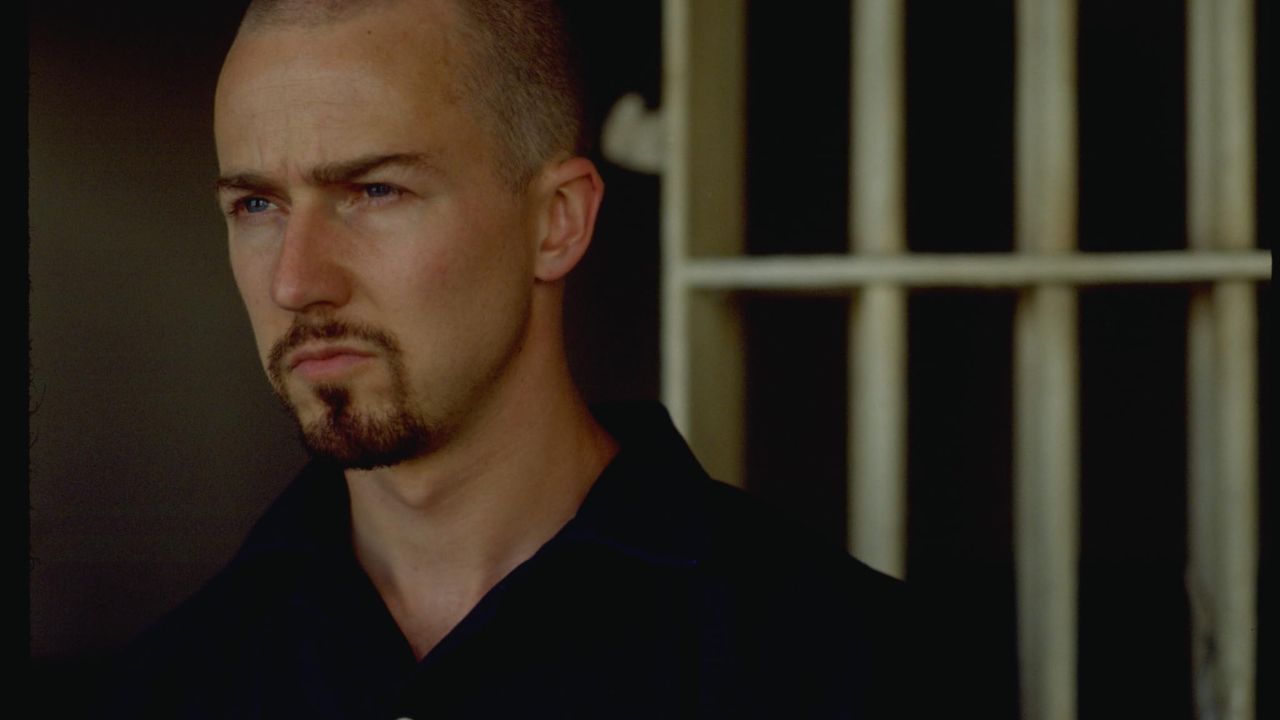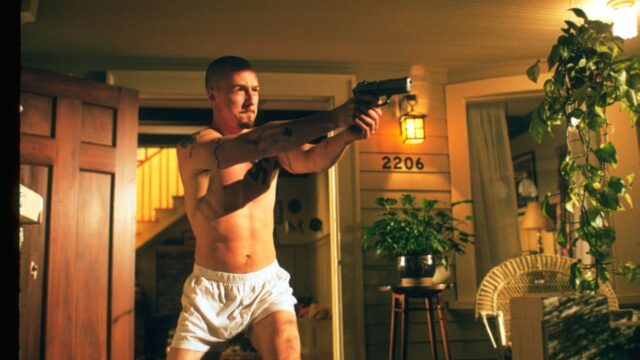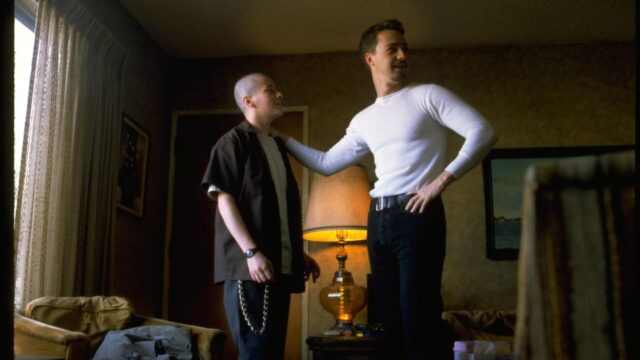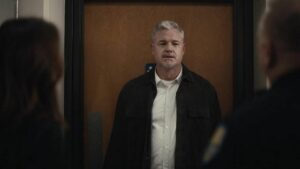The ending of American History X highlights the dark reality of racism and the consequences of generational hatred.
American History X is the 1998 feature film debut of director Tony Kaye with a script by David McKenna. It features performances from Edward Norton, Edward Furlong, Ethan Suplee, Avery Brooks, and more. Edward Norton received a deserving Oscar nomination for the movie, too.
After spending three years in prison for killing multiple black men during an attempted theft, former no-Nazi gang leader Derek Vinyard (Edward Norton) is trying to fix his life and the life of his family.
Dr. Sweeney, the school principal, wants Danny, Derek’s younger brother (played by Edward Furlong), to take over Derek’s role. He proposes a unique history class, “American History X,” where Danny will explore the events leading to Derek’s arrest and how they affected their family.
1. Why American History X’s flashbacks are in black and white?
The captivating film American History X effectively employs a powerful storytelling technique. The transitioning between the present-day narrative (set in 1998) portrayed in full color and impactful flashbacks to Derek and Danny’s early years depicted in black-and-white helps to deliver the message in a better way.
This use of black-and-white visuals to signify different timelines is a commonly used cinematic tool, most notably seen in Christopher Nolan’s Memento. However, the film’s intentional incorporation of this technique may also serve as a symbolic representation of Derek’s past. This further adds a layer of depth to the story.
Since the black-and-white scenes are about Derek becoming a neo-Nazi gang leader, he has a very literal black-and-white perspective of the world. The color transitioning when the footage shifts to his time in prison symbolizes a change in his mindset.
This visual symbolism may seem obvious, but there is one significant exception. In a flashback scene, we see a young Derek playing on the beach with his brother Danny, and the location is shown in color. This perhaps reflects their innocence before adopting a “black and white” view of the world.
2. Why was Derek a Neo-Nazi?
American History X explores the roots of Derek’s racism and affiliation with neo-Nazism through multiple perspectives. One such view is reflected during a meeting between the police consultant Dr. Sweeney and the investigating officers looking into Derek’s involvement with the skinhead gang in Venice Beach.
According to Sweeney, Derek was heavily influenced by his mentor, Cameron Alexander. Cameron was notorious for distributing “white-power literature and videos” in the area.
Sweeney explains how Alexander used Derek to recruit vulnerable and disgruntled youth into the neo-Nazi movement. The tragic loss of Derek’s father also contributed to Derek’s radical beliefs. His father was a firefighter who was fatally shot by a black gang while on duty.
In a recorded statement, Derek explicitly connects his father’s death to race. These influences, coupled with Alexander’s guidance, played a significant role in shaping Derek’s path towards extremism.
3. What happened to Derek in prison?
When Derek first entered prison, he feared for his life. However, his fear was soon replaced with a sense of protection when he found himself being taken under the wing of a neo-Nazi gang.
Derek’s strong beliefs about the outside world interfered with his mind when he noticed the gang’s involvement with non-white prisoners.
However, he was shut down when he tried to voice his concerns and told to keep quiet. As he spent more time in prison, Derek’s tough exterior began to crumble in the presence of Lemont, the black inmate he helped in the laundry room.
Lemont’s warmth and humor slowly broke Derek’s walls until he found himself laughing at his jokes and bonding over their shared love of basketball. Derek also couldn’t ignore the unfairness of Lemont’s arrest, causing him to question his previous criticism of the Rodney King incident.
His newfound friendship with Lemont not only opened his mind but also led him to start mingling with other black inmates and even playing basketball with them.
After this, he stopped sitting with the neo-Nazis at lunch, which was seen as a significant sign of disrespect. As punishment, they cornered him in the shower and raped and beat him. While recovering in the infirmary, Dr. Sweeney visited him and asked, “Has anything you’ve done made your life better?” At this point, Derek is fully ready to leave his life behind, but Dr. Sweeney says he needs to do more than just run from his old life.
4. Why did Danny get shot?
Danny decides to leave the Venice Beach Gang neo-Nazis and Cameron Alexander behind after learning Derek’s prison story. He stays up all night to write his paper for Dr. Sweeney’s “American History X” class, but before he can turn the form in, he’s confronted by a gunman in the school bathroom and shot to death.
The shooter is revealed to be the same black boy Danny confronted in the bathroom at the beginning of the movie, blowing smoke in his face after he was beating up another white student.
The confrontation and shooting in the movie were not racially motivated. However, they cannot be separated from the more significant issue of race prevalent throughout the rest of the story.
With Danny being a well-known skinhead and tensions existing for generations, along with institutional factors at play, it is impossible to ignore the role of race in that crucial moment.
Despite being seemingly random and unrelated to the main plot, Danny’s death holds great significance in the overarching conflict of the movie, much like their father’s death was not explicitly driven by race but was a consequence and driving force in the more significant racial strife.
Danny’s Paper and American History X’s true meaning explained.
Danny’s closing monologue, an excerpt from his paper, sums up the movie’s point reasonably succinctly: “My conclusion is hate is baggage.” Danny learns this lesson in prison when Dr. Sweeney asks, “Has anything you’ve done made your life better?”
His actions had been motivated by hate and only made things worse for himself and his family. But Danny’s quote is more meaningful when observing their dad’s interactions with Derek. The baggage is generational.
Generations of slavery, institutional racism, and more created a situation where Danny’s change of perspective and open-minded paper didn’t change the complex realities of racial conflict.
As Dr. Sweeney tells Derek in prison: “Running just ain’t good enough.” Despite his new perspective after his release from prison, Derek was still trying to get things back to “normal” and trying to resist Sweeney’s requests to intervene in violence brewing between the Crips and the Venice Beach Gang.
Hatred is passed generationally, and just as Derek’s dad planted the seed in him, Derek needs to not only squash it from his life but make sure he doesn’t pass it on. American History X ends with Danny quoting Abraham Lincoln:
“We are not enemies but friends. We must not be enemies. Though passion may have strained, it must not break our bonds of affection. The mystic chords of memory will swell when again touched, as surely they will be, by the better angels of our nature.”
5. About American History X
American History X is a 1998 American crime drama film directed by Tony Kaye (in his feature directorial debut) and written by David McKenna.
The film stars Edward Norton and Edward Furlong as two brothers from Los Angeles who are involved in the white power skinhead and neo-Nazi movements. The older brother (Norton) serves three years in prison for voluntary manslaughter, is rehabilitated during this time, and then tries to prevent his brother (Furlong) from being indoctrinated further. The supporting cast includes Fairuza Balk, Stacy Keach, Elliott Gould, Avery Brooks, Ethan Suplee and Beverly D’Angelo.
McKenna wrote the script based on his own childhood and experiences of growing up in San Diego. He sold the script to New Line Cinema, which was impressed by the writing. American History X was Kaye’s first directorial role in a feature film. Budgeted at $20 million, filming took place in 1997.











No Comments on American History X Ending Explained: What Happens to Derek Vinyard?